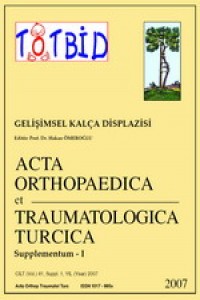Abstract
Gelişimsel kalça displazisi (GKD) tedavisinin en önemli komplikasyonu avasküler nekrozdur. Yirminci yüzyılın ilk yarısında bu sorun GKD tedavisi gören çocukların %30’unda görülüyordu. Bu komplikasyonu önlemek için Arnold Pavlik, 1940’lı yılların sonlarında, kalçanın çok hareketli bir organ olduğu ve iyileşmesi için harekete ihtiyacı olduğu düşüncesinden yola çıkarak dinamik bir tedavi yöntemi geliştirdi. Bu yöntemde, iyileşme için kalça ve dizlere fleksiyon kazandıran bantlar kullanılmaktadır. Bu şekilde, bebek normal bir kalçaya doğal hareketlerle ve kendi kendine sahip olmaktadır. Pavlik’in yöntemi tüm dünyada kullanılmaktadır. Bu derlemede, yapılan çalışmalar ışığında Pavlik tedavi yönteminin komplikasyonlarına dikkkat çekilmesi ve bildirilen başarı ve avasküler nekroz oranlarının özetlenmesi amaçlandı.
Keywords
Abstract
One of the worst complications following treatment of developmental dysplasia of the hip is avascular necrosis. In the first half of the 20th century, the incidence of this problem reached up to 30% of treated children. To avoid this complication, Arnold Pavlik developed a new method in the late 1940s and called it a dynamic approach to treatment, which was based on the ingenious idea that the hip is an organ of movements and needs movement to be healed. Healing is accomplished by using stirrups as an aid to attaining flexion of the hips and knees, whereby the child achieves a normal hip nonviolently by himself. Pavlik’s method spread slowly throughout the world and this literature review points out problems with this method, and summarizes the rates of success achieved and avascular necrosis reported by various authors.
Keywords
Details
| Primary Language | English |
|---|---|
| Subjects | Health Care Administration |
| Journal Section | Review |
| Authors | |
| Publication Date | April 18, 2007 |
| Published in Issue | Year 2007 Volume: 41 |

